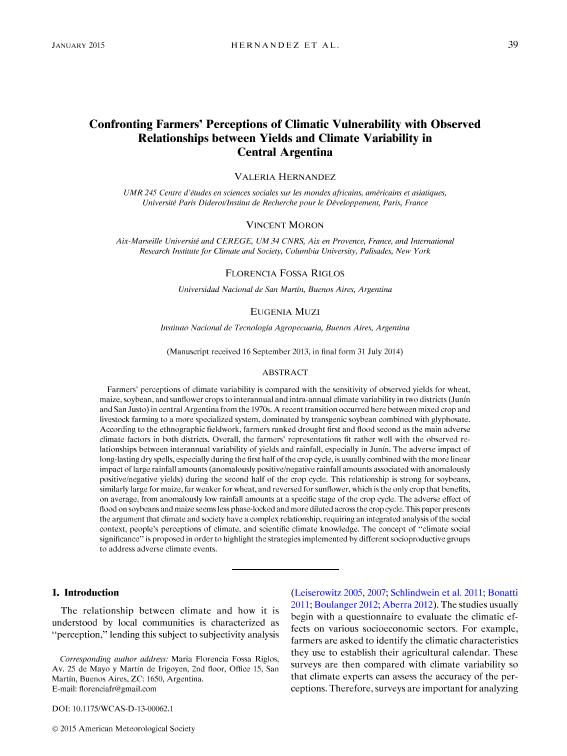Mostrar el registro sencillo del ítem
dc.contributor.author
Hernandez, Valeria
dc.contributor.author
Moron, Vincent
dc.contributor.author
Fossa Riglos, María Florencia

dc.contributor.author
Muzi, Eugenia
dc.date.available
2018-07-03T18:54:41Z
dc.date.issued
2015-01
dc.identifier.citation
Hernandez, Valeria; Moron, Vincent; Fossa Riglos, María Florencia; Muzi, Eugenia; Confronting Farmers’ Perceptions of Climatic Vulnerability with Observed Relationships between Yields and Climate Variability in Central Argentina; American Meteorological Society; Weather, Climate, and Society; 7; 1; 1-2015; 39-59
dc.identifier.issn
1948-8327
dc.identifier.uri
http://hdl.handle.net/11336/51074
dc.description.abstract
Farmers’ perceptions of climate variability is compared with the sensitivity of observed yields for wheat, maize, soybean, and sunflower crops to interannual and intra-annual climate variability in two districts (Junín and San Justo) in central Argentina from the 1970s. A recent transition occurred here between mixed crop and livestock farming to a more specialized system, dominated by transgenic soybean combined with glyphosate. According to the ethnographic fieldwork, farmers ranked drought first and flood second as the main adverse climate factors in both districts. Overall, the farmers’ representations fit rather well with the observed relationships between interannual variability of yields and rainfall, especially in Junín. The adverse impact of long-lasting dry spells, especially during the first half of the crop cycle, is usually combined with the more linear impact of large rainfall amounts (anomalously positive/negative rainfall amounts associated with anomalously positive/negative yields) during the second half of the crop cycle. This relationship is strong for soybeans, similarly large for maize, far weaker for wheat, and reversed for sunflower, which is the only crop that benefits, on average, from anomalously low rainfall amounts at a specific stage of the crop cycle. The adverse effect of flood on soybeans and maize seems less phase-locked and more diluted across the crop cycle. This paper presents the argument that climate and society have a complex relationship, requiring an integrated analysis of the social context, people’s perceptions of climate, and scientific climate knowledge. The concept of “climate social significance” is proposed in order to highlight the strategies implemented by different socioproductive groups to address adverse climate events.
dc.format
application/pdf
dc.language.iso
eng
dc.publisher
American Meteorological Society

dc.rights
info:eu-repo/semantics/openAccess
dc.rights.uri
https://creativecommons.org/licenses/by-nc-sa/2.5/ar/
dc.subject
Farmers Perceptions
dc.subject
Vulnerability
dc.subject
Yields
dc.subject
Climate Variability
dc.subject.classification
Meteorología y Ciencias Atmosféricas

dc.subject.classification
Ciencias de la Tierra y relacionadas con el Medio Ambiente

dc.subject.classification
CIENCIAS NATURALES Y EXACTAS

dc.title
Confronting Farmers’ Perceptions of Climatic Vulnerability with Observed Relationships between Yields and Climate Variability in Central Argentina
dc.type
info:eu-repo/semantics/article
dc.type
info:ar-repo/semantics/artículo
dc.type
info:eu-repo/semantics/publishedVersion
dc.date.updated
2018-07-03T13:53:29Z
dc.journal.volume
7
dc.journal.number
1
dc.journal.pagination
39-59
dc.journal.pais
Estados Unidos

dc.description.fil
Fil: Hernandez, Valeria. Centre National de la Recherche Scientifique. Institut de Recherche pour le Développement; Francia
dc.description.fil
Fil: Moron, Vincent. Columbia University; Estados Unidos
dc.description.fil
Fil: Fossa Riglos, María Florencia. Universidad Nacional de San Martín; Argentina. Consejo Nacional de Investigaciones Científicas y Técnicas; Argentina
dc.description.fil
Fil: Muzi, Eugenia. Instituto Nacional de Tecnología Agropecuaria; Argentina
dc.journal.title
Weather, Climate, and Society
dc.relation.alternativeid
info:eu-repo/semantics/altIdentifier/doi/http://dx.doi.org/10.1175/WCAS-D-13-00062.1
dc.relation.alternativeid
info:eu-repo/semantics/altIdentifier/url/https://journals.ametsoc.org/doi/10.1175/WCAS-D-13-00062.1
Archivos asociados
